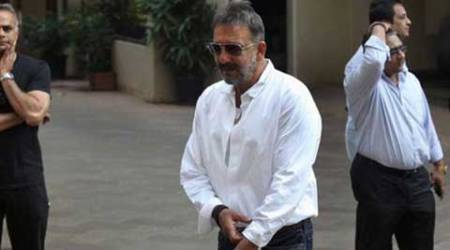 Police taking Abu Salem to Taloja jail after the court sentenced him to life imprionment in Pradeep Jain murder case. Express Photo by Prashant Nadkar. 25.02.2015. Mumbai.
Police taking Abu Salem to Taloja jail after the court sentenced him to life imprionment in Pradeep Jain murder case. Express Photo by Prashant Nadkar. 25.02.2015. Mumbai.
A Special Terrorism and Disruptive Activities Act (TADA) court convicted gangster Abu Salem in the 1993 Mumbai serial blasts case on Friday, after finding him guilty of conspiracy and terrorist activities. Salem, along with Mustafa Dossa, Firoz Abdul Rashid Khan, Tahir Mechant, Riaz Siddiqui were pronounced guilty by the court. One accused Abdul Qayyum was acquitted of all charges after the prosecution failed to prove charges against him. The quantum of punishment is likely to begin on Tuesday.
In an understanding with the Portugal government, Salem was extradited to India in 2005 on the condition that he wouldn’t face capital punishment. He was previously detained in Lisbon in 2002.
For live updates, click here.
Charged under Section 3(5) of the Terrorist and Disruptive Activities (TADA) Act, criminal conspiracy and provisions of Explosives Act, 1884 in the Mumbai serial blast case, Abu Salem falls under the extradition treaty signed between India and Portugal.
Recognising the International law, the Indian government sought Salem’s extradition under the United Nations Convention on Suppression of Terrorism of 2000. On entering the the country illegally and residing, the Portugal judiciary sentenced Abu Salem to five years imprisonment. In between, the Indian government intervened and requested the return of Abu Salem, upon which the Portuguese government agreed on a condition. The Portuguese government returned Salem to India with the assurance that even if the charges against him grievous resulting to death, he would not be sentenced to death.
Known as one of the most coordinated attacks on Indian soil, 13 bombs were triggered across the financial capital at quick intervals on March 12, 1993, killing 257 people and injuring nearly 713. The terrorist attack, believed to be planned by underworld don Dawood Ibrahim and the Memon brothers, was allegedly carried out in revenge for the deaths of Muslims during the 1992 communal riots following the destruction of the Babri Masjid in Ayodhya and the construction of the make-shift temple in its place.

